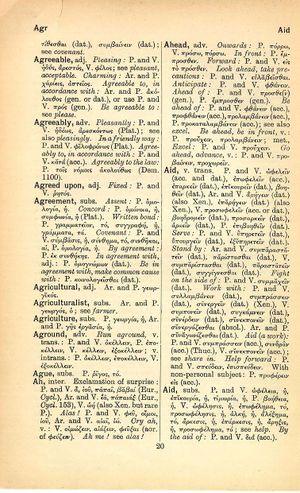agreeably: Difference between revisions
From LSJ
ῥεῖα δ' ἀρίζηλον μινύθει καὶ ἄδηλον ἀέξει, ῥεῖα δέ τ' ἰθύνει σκολιὸν καὶ ἀγήνορα κάρφει → easily he humbles the proud and raises the obscure, and easily he straightens the crooked and blasts the proud (Hesiod, Works and Days 6-8)
(CSV3) |
m (Woodhouse1 replacement) |
||
| Line 1: | Line 1: | ||
{{Woodhouse1 | {{Woodhouse1 | ||
|Text=[[File:woodhouse_20.jpg|thumb|link={{filepath:woodhouse_20.jpg}}]] | |Text=[[File:woodhouse_20.jpg|thumb|link={{filepath:woodhouse_20.jpg}}]] | ||
===adverb=== | |||
[[pleasantly]]: [[prose|P.]] and [[verse|V.]] [[ἡδέως]], [[ἀρεσκόντως]] ([[Plato]]); see also [[pleasingly]]. | |||
[[in a friendly way]]: [[prose|P.]] and [[verse|V.]] [[φιλοφρόνως]] ([[Plato]]). | |||
[[agreeably to]], [[in accordance with]]: [[prose|P.]] and [[verse|V.]] [[κατά]] (acc.). | |||
[[agreeably to the law]]: [[prose|P.]] [[τοῖς νόμοις ἀκολούθως]] ([[Demosthenes|Dem.]] 1100). | |||
}} | }} | ||
Revision as of 08:54, 20 May 2020
English > Greek (Woodhouse)
adverb
pleasantly: P. and V. ἡδέως, ἀρεσκόντως (Plato); see also pleasingly.
in a friendly way: P. and V. φιλοφρόνως (Plato).
agreeably to, in accordance with: P. and V. κατά (acc.).
agreeably to the law: P. τοῖς νόμοις ἀκολούθως (Dem. 1100).

